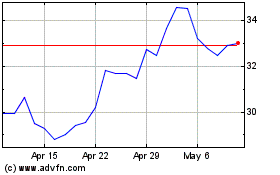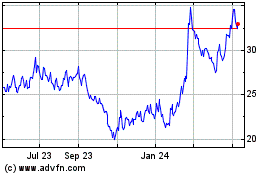Agios Pharmaceuticals, Inc. (NASDAQ:AGIO), a leader in the field of
cellular metabolism to treat cancer and rare genetic diseases,
today announced that the U.S. Food and Drug Administration (FDA)
has granted Breakthrough Therapy designation for TIBSOVO®
(ivosidenib) for the treatment of adult patients with relapsed or
refractory myelodysplastic syndrome (MDS) with a susceptible IDH1
mutation as detected by an FDA-approved test. MDS is a group of
bone marrow disorders that can cause severe complications, such as
infections and uncontrolled bleeding, and can lead to the
development of acute myelogenous leukemia (AML).
“There is a significant need for new targeted therapeutic
approaches for individuals with MDS whose disease continues to
progress despite treatment with standard of care,” said Chris
Bowden, M.D., chief medical officer at Agios. “The Breakthrough
Therapy designation is based on results from the initial 12
patients in the MDS arm of our Phase 1 study in advanced
hematologic malignancies with an IDH1 mutation and recognizes the
potential for single-agent treatment with TIBSOVO® to make an
impact on these patients. We recently re-opened the MDS arm of this
study with the goal of generating sufficient data to pursue a
regulatory filing in this indication.”
The FDA’s Breakthrough Therapy designation is intended to
expedite the development and review of a drug candidate that is
under investigation to treat a serious or life-threatening disease
or condition when preliminary clinical evidence indicates that the
drug may demonstrate substantial improvement over available
therapies on one or more clinically significant endpoints.
Results from the MDS arm of the ongoing TIBSOVO® Phase 1
dose-escalation and expansion study in hematologic malignancies
were presented at the 7th Society of Hematologic Oncology Annual
Meeting, held September 11-14, 2019, in Houston, Texas. These
demonstrate that TIBSOVO® administered as a monotherapy was well
tolerated and associated with durable remissions as well as the
achievement and maintenance of transfusion independence in patients
with relapsed or refractory MDS with an IDH1 mutation. Among the 12
patients who received 500 mg of oral TIBSOVO® daily, the median
treatment duration was 11.4 months. The median age was 72.5 years,
and 42% of patients were age 75 or older. As of the November 2,
2018 data cut-off, 75% (9/12) of patients had a response and 42%
(5/12) had a complete response (CR). The median duration of CR had
not been reached (95% CI, 2.8 months, NE). Of the patients who had
a CR, 60% remained relapse-free at 12 months. In addition, 9 (75%)
patients were transfusion-independent for 56 days or longer during
study treatment. The most common adverse events (AEs) of any grade
were back pain, diarrhea, fatigue and rash. Grade 2 IDH
differentiation syndrome was observed in 1 of 12 patients. No AEs
resulted in permanent discontinuation of treatment.
TIBSOVO® Clinical Development in
MDSThe MDS arm of the Phase 1 dose-escalation and
expansion study evaluating TIBSOVO® (ivosidenib) in adults with
advanced hematologic malignancies with IDH1 mutations is assessing
the clinical activity, safety, tolerability, pharmacokinetics and
pharmacodynamics of TIBSOVO® in adult patients with relapsed or
refractory MDS with a susceptible IDH1 mutation. The arm was
re-opened in October 2019 and will enroll up to 25 total patients
with the goal of generating sufficient data to pursue a potential
regulatory filing in this indication. Study recruitment is ongoing
across 22 sites in the U.S. and France.
About Myelodysplastic Syndrome (MDS)MDS
comprises a diverse group of bone marrow disorders in which
immature blood cells in the bone marrow do not mature or become
healthy blood cells. The National Cancer Institute estimates that
more than 10,000 people are diagnosed with MDS in the U.S. each
year. Failure of the bone marrow to produce mature healthy cells is
a gradual process, and reduced blood cell and/or reduced platelet
counts may be accompanied by the loss of the body’s ability to
fight infections and control bleeding. For roughly 30 percent of
the patients diagnosed with MDS, this bone marrow failure will
progress to AML. Chemotherapy, hypomethylating agents and
supportive blood products are used to treat MDS.
TIBSOVO® is not approved in any country for the treatment of
patients with MDS.
About TIBSOVO® (ivosidenib)
TIBSOVO® (ivosidenib) is an isocitrate
dehydrogenase-1 (IDH1) inhibitor indicated for the treatment of
adult patients with relapsed or refractory acute myeloid leukemia
(AML) with a susceptible IDH1 mutation as detected by an
FDA-approved test. For more information, visit TIBSOVO.com.
IMPORTANT SAFETY INFORMATION
WARNING: DIFFERENTIATION
SYNDROME
Patients treated with TIBSOVO
have experienced symptoms of differentiation syndrome, which can be
fatal if not treated. Symptoms may include fever, dyspnea, hypoxia,
pulmonary infiltrates, pleural or pericardial effusions, rapid
weight gain or peripheral edema, hypotension, and hepatic, renal,
or multi-organ dysfunction. If differentiation syndrome is
suspected, initiate corticosteroid therapy and hemodynamic
monitoring until symptom resolution.
WARNINGS AND PRECAUTIONS
Differentiation Syndrome: See Boxed WARNING. In
the clinical trial, 19% (34/179) of patients with relapsed or
refractory AML treated with TIBSOVO experienced differentiation
syndrome. Differentiation syndrome is associated with rapid
proliferation and differentiation of myeloid cells and may be
life-threatening or fatal if not treated. Symptoms of
differentiation syndrome in patients treated with TIBSOVO included
noninfectious leukocytosis, peripheral edema, pyrexia, dyspnea,
pleural effusion, hypotension, hypoxia, pulmonary edema,
pneumonitis, pericardial effusion, rash, fluid overload, tumor
lysis syndrome, and creatinine increased. Of the 34 patients who
experienced differentiation syndrome, 27 (79%) recovered after
treatment or after dose interruption of TIBSOVO. Differentiation
syndrome occurred as early as 1 day and up to 3 months after
TIBSOVO initiation and has been observed with or without
concomitant leukocytosis.
If differentiation syndrome is suspected, initiate dexamethasone
10 mg IV every 12 hours (or an equivalent dose of an alternative
oral or IV corticosteroid) and hemodynamic monitoring until
improvement. If concomitant noninfectious leukocytosis is observed,
initiate treatment with hydroxyurea or leukapheresis, as clinically
indicated. Taper corticosteroids and hydroxyurea after resolution
of symptoms and administer corticosteroids for a minimum of 3 days.
Symptoms of differentiation syndrome may recur with premature
discontinuation of corticosteroid and/or hydroxyurea treatment. If
severe signs and/or symptoms persist for more than 48 hours after
initiation of corticosteroids, interrupt TIBSOVO until signs and
symptoms are no longer severe.
QTc Interval Prolongation: Patients treated
with TIBSOVO can develop QT (QTc) prolongation and ventricular
arrhythmias. One patient developed ventricular fibrillation
attributed to TIBSOVO. Concomitant use of TIBSOVO with drugs known
to prolong the QTc interval (e.g., anti-arrhythmic medicines,
fluoroquinolones, triazole anti-fungals, 5-HT3 receptor
antagonists) and CYP3A4 inhibitors may increase the risk of QTc
interval prolongation. Conduct monitoring of electrocardiograms
(ECGs) and electrolytes. In patients with congenital long QTc
syndrome, congestive heart failure, electrolyte abnormalities, or
in those who are taking medications known to prolong the QTc
interval, more frequent monitoring may be necessary.
Interrupt TIBSOVO if QTc increases to greater than 480 msec and
less than 500 msec. Interrupt and reduce TIBSOVO if QTc increases
to greater than 500 msec. Permanently discontinue TIBSOVO in
patients who develop QTc interval prolongation with signs or
symptoms of life-threatening arrhythmia.
Guillain-Barré Syndrome: Guillain-Barré
syndrome occurred in <1% (2/258) of patients treated with
TIBSOVO in the clinical study. Monitor patients taking TIBSOVO for
onset of new signs or symptoms of motor and/or sensory neuropathy
such as unilateral or bilateral weakness, sensory alterations,
paresthesias, or difficulty breathing. Permanently discontinue
TIBSOVO in patients who are diagnosed with Guillain-Barré
syndrome.
ADVERSE REACTIONS
- The most common adverse reactions (≥20%) of any grade were
fatigue (39%), leukocytosis (38%), arthralgia (36%), diarrhea
(34%), dyspnea (33%), edema (32%), nausea (31%), mucositis (28%),
electrocardiogram QT prolonged (26%), rash (26%), pyrexia (23%),
cough (22%), and constipation (20%).
- The most frequently reported ≥Grade 3 adverse reactions (≥5%)
were electrocardiogram QT prolonged (10%), dyspnea (9%),
leukocytosis (8%), tumor lysis syndrome (6%), and differentiation
syndrome (5%).
- Serious adverse reactions (≥5%) were differentiation syndrome
(10%), leukocytosis (10%), and electrocardiogram QT prolonged (7%).
There was one case of progressive multifocal leukoencephalopathy
(PML).
DRUG INTERACTIONS
Strong or Moderate CYP3A4
Inhibitors: Reduce TIBSOVO dose with strong CYP3A4
inhibitors. Monitor patients for increased risk of QTc interval
prolongation.
Strong CYP3A4 Inducers: Avoid concomitant
use with TIBSOVO.
Sensitive CYP3A4 Substrates: Avoid concomitant
use with TIBSOVO.
QTc Prolonging Drugs: Avoid concomitant use
with TIBSOVO. If co-administration is unavoidable, monitor patients
for increased risk of QTc interval prolongation.
LACTATION
Many drugs are excreted in human milk and because of the
potential for adverse reactions in breastfed children, advise women
not to breastfeed during treatment with TIBSOVO and for at least 1
month after the last dose.
Please see full Prescribing Information, including Boxed
WARNING.
About AgiosAgios is focused on discovering and
developing novel investigational medicines to treat cancer and rare
genetic diseases through scientific leadership in the field of
cellular metabolism and adjacent areas of biology. In addition to
an active research and discovery pipeline across both therapeutic
areas, Agios has two approved oncology precision medicines and
multiple first-in-class investigational therapies in clinical
and/or preclinical development. All Agios programs focus on
genetically identified patient populations, leveraging our
knowledge of metabolism, biology and genomics. For more
information, please visit the company's website at
www.agios.com.
Cautionary Note Regarding Forward-Looking
StatementsThis press release contains forward-looking
statements within the meaning of The Private Securities Litigation
Reform Act of 1995. Such forward-looking statements include those
regarding the potential benefits of TIBSOVO® (ivosidenib); and the
benefit of Agios’ strategic plans and focus. The words
"expects," "anticipates," "believes," "intends," "estimates,"
"plans," "will," "outlook," "goal", "potential" and similar
expressions are intended to identify forward-looking statements,
although not all forward-looking statements contain these
identifying words. Such statements are subject to numerous
important factors, risks and uncertainties that may cause actual
events or results to differ materially from Agios' current
expectations and beliefs. For example, the FDA’s Breakthrough
Therapy designation for TIBSOVO® (ivosidenib) is not a guarantee of
approval. Management's expectations and, therefore, any
forward-looking statements in this press release could also be
affected by risks and uncertainties relating to a number of other
important factors, including: Agios' results of clinical trials and
preclinical studies, including subsequent analysis of existing data
and new data received from ongoing and future studies; the content
and timing of decisions made by the U.S. FDA, the EMA or other
regulatory authorities, investigational review boards at clinical
trial sites and publication review bodies; Agios' ability to obtain
and maintain requisite regulatory approvals and to enroll patients
in its planned clinical trials; unplanned cash requirements and
expenditures; competitive factors; Agios' ability to obtain,
maintain and enforce patent and other intellectual property
protection for any product candidates it is developing; Agios'
ability to maintain key collaborations; and general economic and
market conditions. These and other risks are described in greater
detail under the caption "Risk Factors" included in Agios’ public
filings with the Securities and Exchange Commission. Any
forward-looking statements contained in this press release speak
only as of the date hereof, and Agios expressly disclaims any
obligation to update any forward-looking statements, whether as a
result of new information, future events or otherwise, except as
required by law.
Investor & Media ContactHolly Manning,
617-844-6630Associate Director, Investor
RelationsHolly.Manning@agios.com
Agios Pharmaceuticals (NASDAQ:AGIO)
Historical Stock Chart
From Mar 2024 to Apr 2024

Agios Pharmaceuticals (NASDAQ:AGIO)
Historical Stock Chart
From Apr 2023 to Apr 2024
